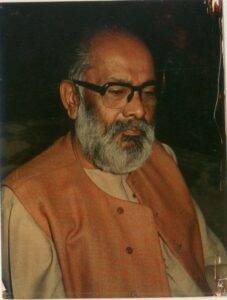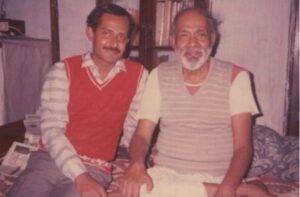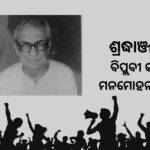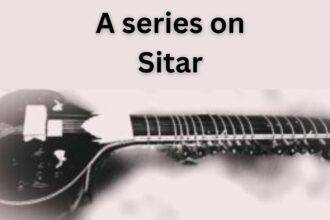Writers: Prof.Sabyasachi Sarkhel and Samidha Vedabala
About the Author

Pt.Sabyasachi Sarkhel
For 30 years, Professor Sabyasachi Sarkhel has dedicated himself to Hindustani Classical Music as a professor at Sangit Bhavana, Visva Bharati, Shantiniketan. His journey includes notable roles as the Dean of Sangit Bhavana and Head of the Department. A devoted disciple of the Imdadkhani Gharana of sitar, he is privileged to carry forward the legacy bestowed upon him by his revered gurus, Pandit Dhruva Tara Joshi and Pandit Suresh Mishra. Prof.Sabyasachi Sarkhel has ardently worked towards preserving the traditional and authentic patrimony of the Imdadkhani style. Throughout his musical odyssey, he has delved into various spheres of study, contributing as a teacher, trainer, and researcher. With a tenure spanning almost three decades, his commitment extends beyond the classroom, as evidenced by his prolific writing—authoring books and numerous research articles. Beyond academia, Prof. Sabyasachi Sarkhel actively engages with initiatives of various universities and educational platforms dedicated to the promotion of music, both in India and abroad. His multifaceted contributions reflect a profound dedication to the rich tapestry of Hindustani Classical Music. Prof.Sabyasachi Sarkhel’s illustrious journey in Hindustani Classical Music is adorned with numerous accolades and honors. His credits boast a collection of prestigious awards and rewards, a testament to his exceptional contributions to the musical domain. These recognitions stand as a testament to his mastery, dedication, and invaluable service to the art form. Prof.Sabyasachi Sarkhel’s commitment to excellence has not only enriched his own musical narrative but has also garnered well-deserved acclaim from the wider community, solidifying his status as a distinguished figure in the realm of Hindustani Classical Music.
…………………………………………………………………………………………………………………………………………………….
Inspired by the heartfelt response to the previous write-up Sri Sabyasachi Sarkhel expressed a keen interest in collaborating to offer an even more comprehensive tribute to his guru, Pt. D.T. Joshi. In a harmonious partnership, we now stand together as co-authors, combining his firsthand narrations with my pen to enrich the tapestry of stories and experiences that commemorate the life and influence of this legendary figure. Today, our collaborative effort seeks to deepen the understanding of Pt. D.T. Joshi’s legacy through an amalgamation of shared memories and literary expression.
Pandit D.T. Joshi is not just a guru imparting musical lessons but a profound guide offering insights into life’s philosophy. His teachings transcended the realms of music, extending to valuable life lessons. The environment within his abode was not merely a learning space but a sanctuary where disciples imbibed not only the melodies from their revered teacher but also the wisdom that shaped their character. Joshiji’s popularity and warm nature turned his home into a vibrant hub, drawing esteemed musicians such as Ustad Vilayat Khan, Pandit Vijay Kichlu,Pt.Radhika Mohan Maitra, Ustad. Mushtaq Ali Khan, A.K.G.Ginde,Pt.Debu Choudhury, Ustad Imarat Khan, Pt.V.G.Jog and Pt. Sunil Bose, the latter being a disciple of Pt. D.T. Joshi.

This convergence of musical luminaries, including Pt. Ajoy Chakraborty, created a dynamic atmosphere, fostering a rich exchange of ideas and experiences. The association with such learned artists elevated the musical journey of disciples under Pt. D.T. Joshi, providing them with holistic learning that extends beyond technicalities. The meetings at his house became more than mere lessons; they became an invaluable forum for cultural exchange, collaboration, and the nurturing of a vibrant musical community. The influence of these interactions resonated in the enriched musical lives of those fortunate enough to be under the guidance of this maestro.
Despite being a virtuoso on the sitar, Panditji faced an unfortunate illness in his right hand, rendering him unable to play the instrument. However, this setback did not stifle his musical journey. A silver lining emerged in the form of his vocal training under the esteemed maestro Ustad Faiyaz Khan, as previously mentioned in the last episode. This unexpected turn of events became a blessing in disguise, allowing Panditji to seamlessly transition into vocal singing. His unparalleled compositions in both sitar and vocal music showcased his adaptability and resilience. Pandit D.T. Joshi stands as a remarkable example of the harmonious association between the sitar and vocal music. As emphasized in numerous previous chapters, Panditji too consistently urged his disciples to recognize the significance of learning vocal music, particularly for sitar students. He emphasized how the vitality of sitar music resides in its intrinsic connection with vocal elements. This unique approach not only defined Pandit D.T. Joshi’s artistic legacy but also served as a guiding principle for his disciples, highlighting the symbiotic relationship between instrumental and vocal expressions in the realm of classical music.

The synergy between sitar and vocal components in Pandit D.T. Joshi’s musical creations has given birth to legendary compositions that continue to shine brightly among both vocalists and instrumentalists, leaving an indelible mark on the classical music landscape. Panditji’s ingenious combination of sitar and vocal elements resulted in compositions that transcend the boundaries of traditional categorizations. The seamless interplay of melodic intricacies and lyrical expressions in his work has become a beacon for musicians, drawing inspiration from both vocal and instrumental traditions. These legendary compositions, marked by their richness and versatility, serve as a bridge between two worlds, captivating the hearts of both vocal and instrumental enthusiasts. The enduring appeal of Pandit D.T. Joshi’s creations lies in their ability to resonate with the soulful nuances of both vocal and instrumental expressions, forging a musical language that transcends generations.
Beyond the technical nuances of music, the invaluable life lessons imparted by Panditji have profoundly shaped the lives of countless disciples who walked the path with him. One of Guruji’s fundamental teachings emphasized that the practice of “riyaz” (practice) extends far beyond the designated time spent playing or singing; it should seamlessly integrate into one’s daily life. According to him, to achieve mastery and excellence in music, one must maintain an unwavering commitment and attachment to the art. Joshiji’s wisdom extended beyond the confines of formal practice sessions, encouraging disciples to carry the spirit of riyaz into every facet of their existence. He stressed that the essence of riyaz should permeate not only the fingers on the strings or the vocal cords but should become an integral part of one’s cognitive processes. He advocated for a continuous, unbroken engagement with music, urging disciples to let the practice of riyaz echo ceaselessly in their minds. This approach went beyond the physical act of playing an instrument or singing; it became a holistic, immersive practice that transcended mere technicalities. By instilling the philosophy that riyaz should be a perpetual presence in the disciple’s brain, he fostered a mindset where music became a constant companion in every moment of life. This profound teaching not only shaped the musicianship of his disciples but also instilled a deeper understanding of the inseparable bond between life and the art of music.
In the end, Pandit D.T. Joshi’s legacy is not just a musical one; it is a living testament to the transformative power of art and the enduring lessons that transcend the boundaries of time and space. His teachings continue to shape the narrative of those who carry his musical torch, ensuring that the harmonious blend of technical prowess and life philosophy remains an everlasting melody in the symphony of classical music.





